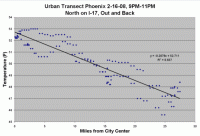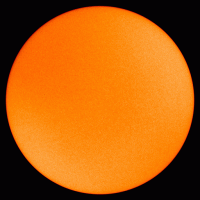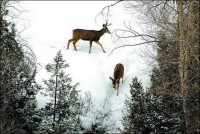Feb 26, 2008
Measuring the Phoenix Urban Heat Island
Climate Skeptic
This is a project my son did for Science Fair to measure the urban heat island effect in Phoenix. The project could also be called “Disproving the IPCC is so easy, a child could do it.” The IPCC claims that the urban heat island effect has a negligible impact, even on surface temperature stations located within urban areas. After seeing our data, this claim will be very hard to believe.
We drove transects two nights in a row. Both nights were cloudless with winds below 5 mph. Ideally, we would have driven between midnight and 6 AM, but this was my kid’s science project and he needs to get to bed so we did it from about 9PM to 11PM. We were concerned that the air might still be cooling during the test, such that as we drove out from town, it might be easy to mix up cooling with time and cooling with location. Our idea for correcting this was to drive and gather data on an entire loop, starting in the center of town, going about 30 miles out, and then returning to the starting point. That way, with data taken in both directions, the results could be averaged and the cooling rate would cancel out. As it turned out, we didn’t even bother to do the averaging. The two trips can be seen in the plots, but the urban heat island shows through pretty clearly in the data and the slope of the line between temperature and distance was about the same on the inbound and outbound legs.

See larger graph here.
I have not inspected their procedure, but looking at the results there seems to be a built-in assumption in the GISS algorithms that they expect an equal chance of a site being biased upwards vs. downwards. In fact, I seem to see more GISS corrections fixing imagined downwards biases than upwards biases. I just don’t see how this is a valid assumption. The reality is that biases in outdoor temperature measurement are much more likely to be upwards than downwards, particularly over the last 50 years of urbanization and even more particularly given the fact that the preferred measuremnt technology, the MMTS station, has a very very short cable length that nearly gaurantees an installation near buildings, pavement, etc.
To this last point, consider this situation: Thermometer one in the city shows 2 degrees of warming. Thermometer two a few hundred kilometers away shows no warming. Someone aware of urban biases without a dog in the hunt would, without other data to guide them, likely put their money on the rural site being correct and the urban site exaggerated or biased. The urban site should be thrown out, not averaged in. However, the folks putting the GISS numbers together are strong global warming believers. They EXPECT to find warming, so when looking at the same situation, absolutely sure in their hearts there should be warming, the site with the 2 degrees of warming looks correct to them and the no warming site looks anomalous. It is for this reason that the GISS methodology should be as public as possible, subject to full criticism by everyone. Read more here.
Feb 25, 2008
Forget Global Warming: Welcome to the New Ice Age
By Lorne Gunter, National Post
Snow cover over North America and much of Siberia, Mongolia and China is greater than at any time since 1966. The U.S. National Climatic Data Center (NCDC) reported that many American cities and towns suffered record cold temperatures in January and early February. According to the NCDC, the average temperature in January “was -0.3 F cooler than the 1901-2000 (20th century) average.” China is surviving its most brutal winter in a century. Temperatures in the normally balmy south were so low for so long that some middle-sized cities went days and even weeks without electricity because once power lines had toppled it was too cold or too icy to repair them.
There have been so many snow and ice storms in Ontario and Quebec in the past two months that the real estate market has felt the pinch as home buyers have stayed home rather than venturing out looking for new houses. In just the first two weeks of February, Toronto received 70 cm of snow, smashing the record of 66.6 cm for the entire month set back in the pre-SUV, pre-Kyoto, pre-carbon footprint days of 1950.
And remember the Arctic Sea ice? The ice we were told so hysterically last fall had melted to its “lowest levels on record? Never mind that those records only date back as far as 1972 and that there is anthropological and geological evidence of much greater melts in the past. The ice is back. Gilles Langis, a senior forecaster with the Canadian Ice Service in Ottawa, says the Arctic winter has been so severe the ice has not only recovered, it is actually 10 to 20 cm thicker in many places than at this time last year. Read more here.
Feb 24, 2008
Atmospheric CO2 and Global Warming
By Z. Jaworowski, T.V. Segalstad, V. Hisdal,
The projections of man-made climate change through burning of fossil carbon fuels (coal, gas, oil) to CO2 gas are based mainly on interpretations of measured CO2 concentrations in the atmosphere and in glacier ice. These measurements and interpretations are subject to serious uncertainties.
As indicated by the measurements of radiocarbon (Carbon 14) from nuclear 14 test explosions the residence time of CO2 in the atmosphere is only 5 years. Assigning a longer atmospheric residence time (up to 200 years) for man-made CO2 was made to fit the pre-conceived idea that the 19th century CO2 atmospheric level was 25% lower than now. The value of about 280 ppmv, widely accepted from glacier studies as the pre-industrial atmospheric CO2 level results from invalid assumptions, processes in ice sheets and artifacts in ice cores.
The atmospheric CO2 is constantly changing and adjusting its concentration according to the natural changes in the Earth’s temperature. These changes are governed by inorganic thermodynamic gaseous, aqueous and mineral equilibria, and by biologic processes. Anthropogenic CO2 is negligibly small compared to the gigantic natural reservoirs and fluxes of natural CO2.
CO2 has a high solubility in water. Lower aqueous solubility of CO2 at higher temperature cause the oceans to degas CO2 to the atmosphere when the sea and air temperature rises as a result of natural climate change. This leads to an increase of CO2 concentration in the atmosphere, which in this case is an effect and not a cause of climatic change. The atmospheric CO2 increases in the 20th century were found to lag behind increases of the surface air temperature. A warming effect of the increased atmospheric CO2 may be counterbalanced by powerful negative feedback mechanisms, such as increasedcloudiness. Radiocarbon (Carbon 14) studies show that the upper ocean turn over the dissolved atmospheric CO2 in a short time (a few decades), thus effectively eliminating the bulk of the man-made CO2.
The exploitable total fossil fuel carbon reservoir is only 11 times larger than the atmospheric carbon reservoir. About fifty parts of CO2 are dissolved in the oceans for each part released to the atmosphere. Therefore, a permanent doubling of the atmospheric CO2 cannot be realized from burning of fossil fuels only, all other things being held constant. There are several methodological uncertainties in the analysis and data processing of the
current atmospheric CO2 concentration. Further investigations of these problems seem necessary. For full paper go here.
This important updated paper challenges current greenhouse theory and data in a very significant way and though technical is worth your reading and consideration. Also take a look at the draft paper by John Nicol in the Climate Library with much additional insight on this important issue.
Feb 23, 2008
The Coming of a New Ice Age
By Gerald E. Marsh
Contrary to the conventional wisdom of the day, the real danger facing humanity is not global warming, but more likely the coming of a new Ice Age. What we live in now is known as an interglacial, a relatively brief period between long ice ages.
Unfortunately for us, most interglacial periods last only about ten thousand years, and that is how long it has been since the last Ice Age ended. How much longer do we have before the ice begins to spread across the Earth’s surface? Less than a hundred years or several hundred? We simply don’t know.
Even if all the temperature increase over the last century is attributable to human activities, the rise has been relatively modest one of a little over one degree Fahrenheit - an increase well within natural variations over the last few thousand years. While an enduring temperature rise of the same size over the next century would cause humanity to make some changes, it would undoubtedly be within our ability to adapt.
Entering a new ice age, however, would be catastrophic for the continuation of modern civilization. NASA has predicted that the solar cycle peaking in 2022 could be one of the weakest in centuries and should cause a very significant cooling of Earth’s climate. Will this be the trigger that initiates a new Ice Age? We ought to carefully consider this possibility before we wipe out our current prosperity by spending trillions of dollars to combat a perceived global warming threat that may well prove to be only a will-o-the-wisp.

Today’s solar image showing sun is still asleep nearly 12 years from last solar minimum
Gerald Marsh is a retired physicist from the Argonne National Laboratory and a former consultant to the Department of Defense on strategic nuclear technology and policy in the Reagan, Bush, and Clinton Administration.
Feb 17, 2008
Colorado Department of Wildlife Forced to Feed Deer in Eagle County
By Matt Terrell, Eagle County Correspondent
Feeding operations were started because the animals appear to be in desperate condition. Because of a harsh and snowy winter, wildlife managers will start feeding starving deer near Eagle and Wolcott for just the third time in almost 25 years. The consistent, heavy snowfall that’s been so good for the ski slopes has covered up the small plants and shrubs, like sage brush, that deer eat in the winter. Deer don’t store as much fat as elk, so those plants that poke up through the snow are vital to their survival.
Now, the deer are hungry enough to start stripping juniper trees, which have almost no nutrition. It’s a sure sign of desperation, says Randy Hampton, spokesman for the Division of Wildlife. The Division of Wildlife will only consider feeding animals if there’s a chance more than 30 percent of adult female deer will die in a winter. This has only happened in the winters of 1983-1984 and 1996-1997, and it looks like that could happen.

Colorado Department of Wildlife Photo
|





